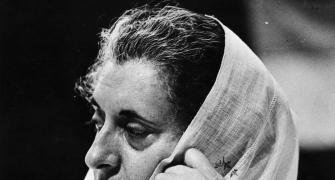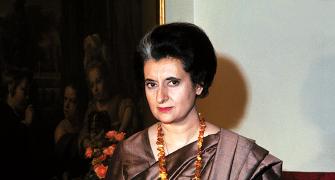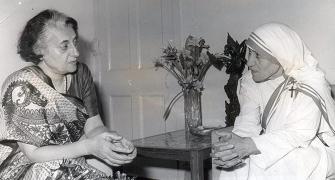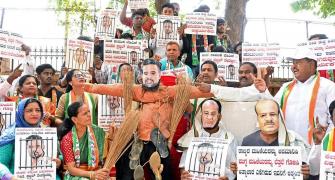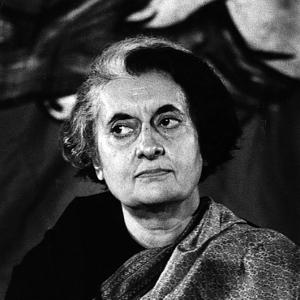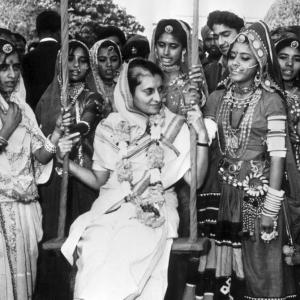'Fearlessness, courtesy, humour, wide interests and wisdom, deep commitment to Indian science and technology, passion for the environment, objectivity and the ability to see many things through not only a national but also an international prism.'
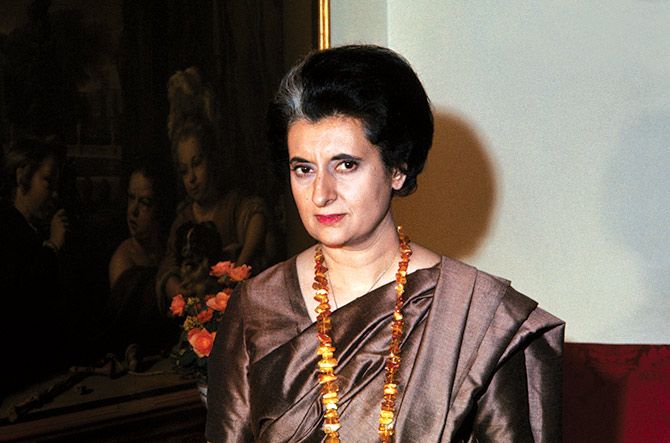
After this visit she would devalue the rupee in return for aid from America, a politically unpopular move that brought her into confrontation with a group of veteran Congress leaders.
Photograph: Bettmann/Getty Images/Kind courtesy Juggernaut
R Rajamani worked in the Prime Minister's Office between 1978 and 1983.
During this tenure he worked for three prime ministers: Morarji Desai, Charan Singh and Indira Gandhi.
Later in his stint as additional secretary at the Cabinet Secretariat and as secretary (electronics), he was associated with then prime minister Rajiv Gandhi.
Having worked for Indira Gandhi for three years between 1980 and 1983 he observed many of her qualities and remembered the late prime minister in a special feature for Rediff.com. As told to Radhika Rajamani:
My respected senior colleague in the PMO H Y Sharada Prasad was once asked why he did not write about the prime ministers he worked with. He laughed and said: "Who am I, a child trying to inscribe my name on the giant oak trees of the forest?"
This did influence me in desisting from writing or talking too much about the four prime ministers I worked for, especially Indira Gandhi for whom I worked for three years as joint secretary. There were other reasons too.
Again, Sharadaji used to say that when one wrote years later about events which had occurred earlier in which one played some part, there is a temptation to put in words what one thought in retrospect one should have said then, but never really said them!
However, the main reason for avoiding these reminiscences was that I remember only the good things about people whereas most readers seem to want to read about the seamy side of great personalities.
If I do communicate my thoughts now it's not because of the temptation to break into the limelight, but in the expectation that people will know that the good that men do lives after them while the evils are interred with them.
There is devilishness and godliness or goodness in all of us in varying degrees (saints excepted) and it is pleasant to talk about the good traits and deeds of great people.
What qualities in Indira Gandhi should I talk about?
Before I answer this question I should emphasise that all the four prime ministers I worked for had most of these qualities in varying degrees and it was indeed a privilege and a great learning experience with them.
I have chosen Indira Gandhi because I had the longest term with her.
The qualities of fearlessness, courtesy, humour, wide interests and wisdom, deep commitment to Indian science and technology, passion for the environment, objectivity and the ability to see many things through not only a national but also an international prism -- these were some aspects of her life and personality which come out in the episodic narrative I have chosen to adopt.
Fearlessness
I single this out as the strongest trait -- fearlessness to do what she thought was in the national interest and fearlessness in the personal sense; physical and mental courage in adverse circumstances. This was translated into courage which infected others.
I am reminded of the golden age of the Independence struggle when leaders led from the front as in the case of T Prakasam or G B Pant who always stood in the first row to face bullets or lathis.
It was the hallmark of Indira Gandhi's father Pandit Jawaharlal Nehru, who one remembers in the Avadi Congress session jumping into an enclosure to calm down some misguided sections which was trying to disturb the proceedings unmindful of the appeals of even Kamaraj Nadar!
One example in her life was when the door opened in the aircraft where she was sitting alone in the front cabin soon after take-off.
The advice from the cockpit asking her to go to the back section was not heeded and when we tried to persuade her to come back she gave only a disarming smile which radiated her fearlessness. She did not leave the seat until we landed.
Of course, one has read about the fearless way she handled the Bangladesh war and other similar situations, putting the national interest above those of personal safety.
Courtesy
As for courtesy, she had this in abundant measure and was the picture of friendliness with whomsoever she interacted, whether it was a poor lady in a village in Medak district (of which was an MP) or a visiting dignitary from abroad.
The manner in which she reciprocated Cuban President Fidel Castro's bear hug at the Non Aligned Summit is etched in memory. She responded shyly, but without fuss, thus cementing a friendship.
The only occasion when I found her losing her cool was when we were in the Andaman islands, visiting the Onge tribe there. As the helicopter hovered above the settlement built for the Onges, she asked me to find out what the tin roofed structures were.
When we landed I found out these were hutments made for the Onges who normally lived in small huts on treetops and moved from place to place as their defecation mounds grew under the trees. This was ecologically sustainable as the land was nourished and they had a cooler micro-climate atop the trees.
When I reported this to her, I realised she was upset.
To compound this, the Onges who were clad in multi-coloured T-shirts were brought for dancing around her.
When she asked the anthropologist present whether this was their usual mode of dress, he whispered they were not in the habit of wearing anything except a brief loin cloth and both men and women were bare-bodied.
On hearing this, she was in a rage and asked all the officers present if they realised what they had done this to these innocent people by locating them in hot tin sheds, away from their natural habitat and worse, making them wear ill-fitting and colourful clothes which they were not used to.
She thundered if they thought the prime minister of India would hesitate to talk to her people whether in their clothes or lack of it and how they had destroyed most of their values forever.
Humour
Indira Gandhi was not given to flippant humour, but showed flashes of mature humour on occasions.
Thus when the Indian Board for Wildlife was meeting and there were two consecutive items on the agenda, one relating to Save the Crocodile Project and the other to the scrapping of the Andhra Pradesh Preservation of the Elephants Act, I scribbled a note to her to say this was like the 'Gajendra Moksha' in reverse.
She laughed heartily and read this out loudly to the members of the board.
This got me into some difficulty with the Andhra Pradesh forest minister when we left the meeting and he said I have created a situation to seem as if the AP government was being insensitive to the cause of conservation, even though the ground reality was that there were no elephants in the state and there was no point in continuing an archaic enactment as a successor to the old Madras state.
I told him politely this was said in good humour and there was no reason why Andhra Pradesh should not have wild elephants now.
Soon after this episode one was happy to know that wild elephants have indeed come into Andhra Pradesh in Chittoor district and now have a sanctuary for themselves!
The other bit of humour was displayed by the prime minister when she came up to me sitting in the officers's box in Parliament.
When I tried to stand up deferentially, she smiled and said, "Don't tower over me like that. Sit down" and let my tall frame go back into the chair and shaking in mirth!
Interests
Her wide interests and wisdom were manifested often in the midst of all the routine and pressure of work.
Whenever she found time, especially on domestic air travel, she would read a book.
Her interests were in a wide spectrum and covered not only the economic and political issues which were the daily bread and butter in her office, but also discussions on India's future in wrestling with problems of education, health and employment.
After a visit to Medak where she saw the good effects on welfare, hygiene, nutrition and health of women and children as a result of a pilot Integrated Child Development Services Project a few years after it was wound up, she included this in her Twenty Point Programme.
Her interests extended to our culture, heritage and the arts; testimony to which is the present day INTACH (the Indian National Trust for Art and Cultural Heritage) and IGNCA (the Indira Gandhi National Centre for the Arts), for which the ground work was done in her time.
She could visualise India's future lay in new initiatives in electronics, renewable sources of energy, ocean development, bio technology and entrepreneurship development in young technocrats to turn job seekers into job givers.
She helped create suitable administrative and technical structures. I must add that I have named only a sample of the initiatives which were the result of her wisdom and farsightedness.
The firm belief that science and technology were the anchors of the economy governed Mrs Gandhi's efforts in this field. She created scientific departments and encouraged both research efforts and the technological spinoffs.
Examples abound but mention can be made of the beginning of the Indian scientific expeditions to Antarctica and her belief in twinning new science and technology with traditional practices having a scientific content.
Thus when the scientists of the Indian Council of Medical Research were extolling the virtues of the plant ocimum sanctum in stress relief, she asked them what the Indian name was.
When told it was Tulsi, she smiled and said "My grandmother knew this about Tulsi and used to give us Tulsi tea whenever we were too naughty!"
On another occasion, as we came out of an inspection bungalow we were camping at, she pointed out to me a small plant with pink and white flowers and asked if I knew what it was.
Not hiding my ignorance I said I do not know the name, but in my part of the country it was known as the smashan flower, being found only in crematoria and burial grounds.
She smiled and educated me that it was the plant vinca rosea (since renamed catharanthus rosea) which bore the common name of Periwinkle.
She added for good measure that the chemical extract of the flower was being used for treatment of a type of cancer.
No piece like this on her would be complete without mentioning the passion for conserving India's natural resources, whether it was the forest, or the flora and fauna, or the rivers, water bodies, coral reefs and so on.
Her special interest was in ecosystems like the mountains, islands, coastal, coral reefs and riverine tracts.
She was the only head of government from outside Sweden to attend the first UN Conference on the Human Environment and drawing the linkages between under-development poverty and the conservation of natural resources.
She was alarmed at the degradation of Indian forests and coastal ecosystems and their mindless conversion in the name of development without exploring alternatives.
She got enacted the Forest Conservation Act and made us introduce environmental impact analysis in public sector projects. The coastal zones were protected under her directive, which stood the test until a law was enacted later.
The only two projects she stopped in the interests of conserving biodiversity and the fragile Himalayan ecosystem were the Silent Valley Project and the Tehri Hydro Electric Project.
It is noteworthy that in both cases there were alternatives to produce the same power with micro and mini hydel sets causing no damage to the environment. Unfortunately, the Tehri project was reopened later underlining the mindset that 'Big is Beautiful'.
In the present day context with spotlight on conservation of electricity to moderate climate change one cannot but remember her frugality in eating and her keenness to switch off all lights when she left a room.
The measures she took to promote solar and wind energy and increase afforestation through social forestry were noteworthy and gave a clear impression that she was a champion of a clean and green environment for all generations of Indians.
Her objectivity and ability to understand different sensibilities and perspectives were outstanding and this was tempered by her being able to be nationalistic and yet breathe a universality of spirit.
Once her personal secretary had collected a sheaf of petitions and sorted them out and was giving one set to me as she was boarding the plane.
She was quick to spot this out of the corner of her eye and said no, that is not for him as it is political and only the other set should be given to him. Thus, she recognised the need for objectivity in recognising the role plays among people who worked for her.
When there was a discussion on India signing an International Labour Organisation convention on child labour and the official view was hesitant, she looked at it from both national and international prisms and ruled that we cannot do wrong just because other countries got away with doing things wrong about their children and getting away with it.
Before I finish I should relate what happened when I had returned to Andhra Pradesh to work in the state government. In August 1984, Mrs Gandhi visited Hyderabad en route to Medak to inaugurate an ordinance factory.
As her principal secretary Dr P C Alexander was coming with his wife and wanted me to go to the airport to take Mrs Alexander to my house while he went on the visit.
In the afternoon when he came home he asked me why I did not try to see my old boss Indira Gandhi.
I told him, how, as a mere bureaucrat, it was not possible for me to muscle into the largely political crowd surrounding her. He told me sternly that I should make an attempt in the evening when they were leaving.
At the airport I made an effort, but again the crowd was such that she reached the ladder of the aircraft and so I was turning back disappointed.
Mrs Gandhi, on reaching the landing, seems to have spotted my back and called out "Rajamani, what are you doing here?"
I went up to the aircraft and she lent over and asked me how my daughter, son and wife were and whether I was OK.
I mumbled something in the affirmative, being overcome by her affection in remembering me even after one-and-a-half years of leaving office and conscious of all eyes of all the visitors including the chief minister being on me!
She sweetly said "All the best to you and the family" and left.
Sadly, that was the last I saw of her.
In all the short references and cameos I have tried to capture some of the fine qualities of Indira Gandhi but by no means is it a biographer's job or an incisive presentation which would satisfy the purist.
Perhaps it ends up as a feeble attempt at inscribing one's signature on a giant oak tree in the forest after all!
This feature was first published on Rediff.com on October 30, 2009.

